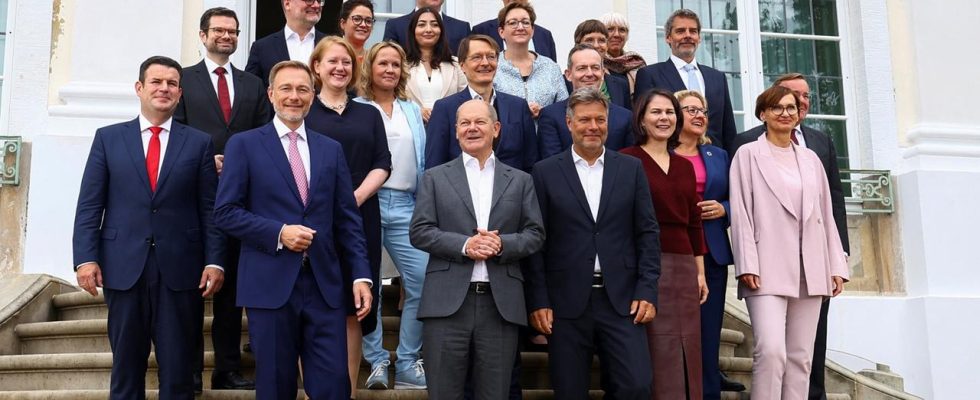background
At the end of the cabinet meeting, Chancellor Scholz, Economics Minister Habeck and Finance Minister Lindner presented the results: tax breaks for companies, less bureaucracy, more digitization. An overview.
Since March, the government’s work has been plagued by fierce arguments – there were disputes above all over the heating law or basic child security. At the cabinet meeting at Meseberg Castle in Brandenburg, the traffic light coalition wanted to agree on various projects. At the end, Federal Chancellor Olaf Scholz, Economics Minister Robert Habeck and Finance Minister Christian Lindner presented the results. The proposed legislation is now being discussed in the Bundestag.
Tax relief for the economy
Finance Minister Lindner’s so-called Growth Opportunities Act contains 50 tax breaks. Relief of around seven billion euros per year from 2024 and a total of over 32 billion in the next few years are planned. Initially, only around six billion euros were planned annually. The core is a premium for investments in climate protection: Regardless of the profit, a tax investment allowance of 15 percent of the investment sum should be paid.
Above all, medium-sized companies should benefit from an expansion of loss offsetting. New depreciation options should improve the liquidity of companies and ensure investments. Business associations and the Greens recently complained that the package was not extensive enough to actually protect companies in the economic downturn.
Less bureaucracy for companies
Justice Minister Marco Buschmann wants to use a bureaucracy relief law to noticeably reduce the workload in the “bureaucracy jungle” in Germany, especially for small and medium-sized companies. For the economy, the complicated procedures are a real reason not to invest. “We are convinced that many companies in Germany are suffering from bureaucratic burn-out,” said Buschmann when presenting his plans. Among other things, the commercial and tax law retention periods for accounting documents are to be reduced from ten to eight years. In the future, hotels will no longer have to fill out a registration form for each individual guest.
So far, Buschmann’s plans are just cornerstones; a concrete draft law is to be presented before the end of the year. According to the FDP politician, the planned measures should save 2.3 billion euros a year. “In the future, paper will also be thrown away more quickly in companies,” says Buschmann.
Electronic patient record
After years of delays, electronic prescriptions and digital patient files are to be used on a broad front. This is the aim of the legislative plans by Health Minister Karl Lauterbach, which the Federal Cabinet has launched. By the beginning of 2024, e-prescriptions should become the standard and mandatory for practices. At the beginning of 2025, all those with statutory health insurance should receive electronic patient files – unless they actively object.
The availability of the data should, for example, avoid double examinations and improve medical treatments. Scientists and pharmaceutical companies should also be able to use pseudonymised health data for their research.
Georgia and Moldova as safe countries of origin
As a reaction to the increasing number of asylum seekers in Germany, Georgia and the Republic of Moldova are to be declared safe countries of origin. This is provided for in a draft law by Federal Interior Minister Nancy Faeser, which the cabinet has passed.
With the listing as a safe country of origin, asylum applications from people with this nationality are processed more quickly, and early deportation becomes possible. This should make Germany less attractive for people from these countries to apply for asylum.
According to the Federal Ministry of the Interior, asylum applications from nationals of Georgia and the Republic of Moldova are mostly rejected. The recognition rates in 2022 and in the first half of 2023 were below 0.1 percent for both countries. More than ten percent of the rejected asylum applications in Germany come from these two countries alone. According to further information, 8,865 Georgians and 5,218 people from Moldova applied for asylum in Germany last year. The individual right to an individual assessment for asylum applicants from Georgia and Moldova remains unaffected by the listing.
More leeway for the BND
The cabinet has also decided to reform the BND law. This involves restricting the transmission of personal data by intelligence services to the police and public prosecutor’s offices. The draft amendment to the BND law envisages that all transmission regulations in the BND law will be decoupled from the Federal Constitutional Protection Act and that separate regulations will be drawn up.
The reform plans are also a response to the Federal Intelligence Service’s Russia espionage scandal last year. In order to better secure the BND against espionage by its own employees in the future, it should be possible to carry out checks on people, bags and vehicles without any suspicion. Private devices such as smartphones should also be able to be checked if there is a suspicion. “Possible espionage activities by other intelligence services should be detected early by the controls,” says the draft.
Artificial intelligence in administration
With the adopted data strategy, the federal government wants to create the technical and legal requirements for the use of AI applications in administration over the next two years. The Federal Government does not rule out the development of its own AI language models, which are referred to in technical jargon as Large Language Models (LLM).
The resolution paper stipulates that the Advice Center for Artificial Intelligence in Public Administration (BeKI), the Algorithm Assessment Center for Authorities and Organizations with Security Tasks (ABOS) and the Federal Data Protection Commissioner will be involved. Together with the data laboratories of the federal ministries, the institutions should ensure compliance with data security and data protection and follow the guidelines of digital sovereignty in order to make the potential of AI usable for the public sector.

